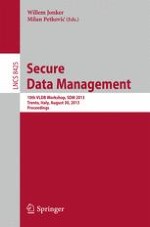2014 | OriginalPaper | Buchkapitel
Privacy Implications of Privacy Settings and Tagging in Facebook
verfasst von : Stan Damen, Nicola Zannone
Erschienen in: Secure Data Management
Aktivieren Sie unsere intelligente Suche, um passende Fachinhalte oder Patente zu finden.
Wählen Sie Textabschnitte aus um mit Künstlicher Intelligenz passenden Patente zu finden. powered by
Markieren Sie Textabschnitte, um KI-gestützt weitere passende Inhalte zu finden. powered by
